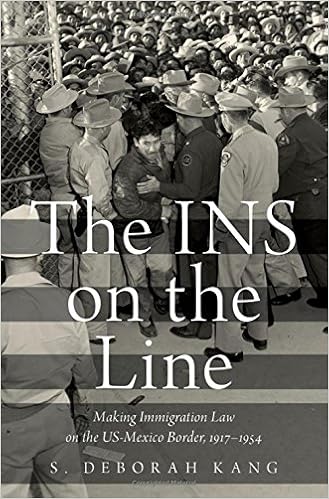A timely release from Oxford University Press: (California State University, San Marcos). A description from the Press:
For much of the twentieth century, Immigration and Naturalization
Service (INS) officials recognized that the US-Mexico border region was
different. Here, they confronted a set of political, social, and
environmental obstacles that prevented them from replicating their
achievements on Angel Island and Ellis Island, the most restrictive
immigration stations in the nation. In response to these challenges,
local INS officials resorted to the law, nullifying, modifying, and
creating the nation's immigration laws and policies for the borderlands.
In The INS on the Line,
S. Deborah Kang traces the ways in which the INS on the US-Mexico
border made and remade the nation's immigration laws over the course of
the twentieth century. Through a nuanced examination of the agency's
legal innovations in the Southwest, Kang demonstrates that the agency
defined itself not only as a law enforcement unit but also as a
lawmaking body. In this role, the INS responded to the interests of
local residents, businesses, politicians, and social organizations on
both sides of the US-Mexico border as well as policymakers in
Washington, DC. Given the sheer variety of local and federal demands,
local immigration officials constructed a complex approach to border
control, an approach that closed the line in the name of nativism and
national security, opened it for the benefit of transnational economic
and social concerns, and redefined it as a vast legal jurisdiction for
the policing of undocumented immigrants.
The composite approach
to border control developed by the INS continues to inform the daily
operations of the nation's immigration agencies, American immigration
law and policy, and conceptions of the US-Mexico border today.
A few blurbs:
"Kang's deeply researched book yields powerful insights about the
importance of studying immigration law in action, shifting our focus
from Congressional policy-makers in the nation's capital to low-level
immigration officials on the nation's southwestern border with Mexico in
the first half of the twentieth century. Short on resources and torn
between competing interests, immigration officers used their most
powerful weapon--administrative discretion--to devise procedures that
ultimately became national policy. Want to understand what made today's
militarized border possible? Read this book!"--Lucy E. Salyer
"The INS on the Line is a superb book. Kang
provides an institutional history of the Immigration and Naturalization
Service on the US-Mexico border that is engaging and deeply
illuminating. She illustrates the myriad ways in which rank and file
agency officials stationed in California, Arizona, and Texas not only
implemented federal immigration law, but also helped craft the law
itself, demonstrating that they did so not only to better reflect the
complex realities of border life but also to better serve the agency's
own interests. Though focused on the first half of the twentieth
century, the book contains critical insights for our understanding of
contemporary immigration policy. This timely book is a must-read for
scholars interested in immigration policy, borderlands studies, and the
American administrative state."--Cybelle Fox
More information is available
here.
